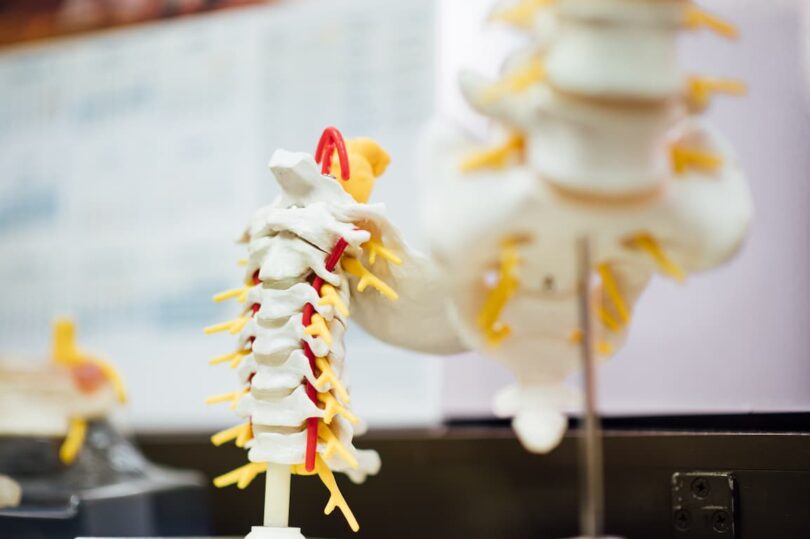Research has found that there is a link between posture and fatigue. Good posture is important as it protects our nervous system through the stability of our skeletal and muscular systems.
Cerebrospinal fluid (CSF) is a liquid that surrounds our brain and spinal cord. Immunologically and structurally, it does a fantastic job at protecting our nervous system. It regulates the electrolytic environment of our central nervous system (our systemic acid-base balance) and eliminates waste products. It is also responsible for the transportation of nutrients, hormones, neurotransmitters, releasing factors and other neuropeptides. Therefore, it is vital for our health to preserve the healthy flow of our CSF.
Unfortunately, poor posture and neuromechanical dysfunction can hinder our CSF flow by building up pressure gradients, decelerating the process of removing brain waste material. The dural venous sinuses take the CSF and move it out of the brain and spinal cord, removing the central nervous system waste with it. This process is fundamental for our health, so we want to prevent subluxations and negative postural changes that can have an impact on our CSF flow.
Respiration is a key mechanism for CSF flow. As we breathe in and out, our cranial nerves pump CSF fluid. Postural changes, such as forward head postures and thoracic kyphosis (hunchback), can cause restrictions in the cervical and upper thoracic regions . This has the ability to hinder our lung function, rib excursion and tidal volumes. It can also lead to temporal-mandibular joint dysfunction, causing jaw tension which has an overall impact on the cranial nerve system.
Poor posture resulting in vertebral subluxations in your upper spine is an issue because the atlas is extremely close to our internal jugular vein. This vein gathers blood from our brain, face and neck, and sends it to our right atrium. If our atlas is subluxated, that can impinge the drainage function of our internal jugular vein. With this, we will see an increase in our CSF pressure due to the lack of drainage. Our lymphatic channels are pressure dependent. With this rise in CSF pressure, our lymphatic vessel in the brain can no longer work efficiently. This results in poor drainage of venous blood out of our cranial cavity. Therefore, it is important to maintain good head posture to ensure optimal transportation of blood and fluid to and from our brain.
The human head should weigh approximately 8% of our total body mass. This occurs when we have proper alignment of our spine. Unfortunately, due to our lifestyle habits that involve working on computers and being on our phones, it is not uncommon to see many individuals with a forward head posture. With every 2.5cm that the head moves forward, we see its weight double. The muscles in our neck, shoulders and upper back have to compensate for this instability and work extra hard to support our head in this position. This means that with excessive contraction and tightness, it is likely that we will feel fatigue and pain.
Forward head posture can also lead to many other symptoms. It was found that 95% of people who suffer from headaches had a forward head posture. Not only do we see a displacement in our head position, but in response to such, our shoulders will round forward, which may compress our chest cavity. As a result, there will be a reduction in air capacity within the lungs and therefore, oxygen intake. This is detrimental because our muscles then work overtime to support our head in this unnatural position. If it is not receiving enough oxygen, lactic acid will form in our muscles which can lead to cramping, headaches and feeling tired.
The Louveau discovery changed our understanding of brain science when Dr Antoine Louveau discovered a lymphatic vessel in the brain, showing a presence of lymphatic channels. This is important, for we now understand that there are immune cells within this vital organ that travel in and out of our brain and body to do what it needs through these lymphatic channels. When our neck sits too forward of our body, it causes pressure on our spinal cord, which is a direct interference to how our brain is communicating with our body and the messages being sent out through our spine to our nervous system.
Our autonomic nervous system is responsible for the regulation of our heart rate, breathing, hormone release, digestion, defence cells and immune cells. If there is an interference with this, it is likely that we will see weaker immune function. This means that poor posture can lead to feeling sick more frequently.
The 1980 Nobel Prize recipient for brain research, Dr Roger Sperry, concluded that 90% of our brain’s energy is dedicated towards posture alone. If we have poor posture that inhibits our muscles and ligaments’ ability to work optimally, our brain has to exert more energy into maintaining this unhealthy position under gravity. This in turn results in less energy for other vital processes such as metabolizing, cognition and healing.
Therefore, when we think about poor posture, we should not only consider the physical effects it has on our appearance, but also how it affects our brain and its health. We want to adopt good behaviours and healthy habits that help us remain upright with good posture to promote not only looking good, but feeling good too!

